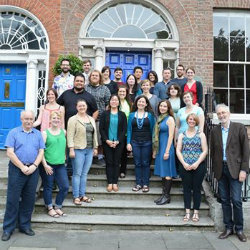2014 Irish Seminar Creates More Questions than Answers

The 2014 Irish Seminar took place June 16-July 4 in Dublin, Ireland with lectures, public readings and seminars at the Royal Irish Academy and O’Connell House, Notre Dame’s Dublin global gateway.
An annual event since 1999, this year participants explored the theme of “The Vernacular Imagination”, during a period of exceptionally fine Irish summer weather. Chair Diarmuid Ó Giolláin, with support from the Keough-Naughton Institute for Irish Studies at the University of Notre Dame, brought together a program of leading scholars and noted writers for the benefit of international graduate students.
Explains Ó Giolláin, “the word vernacular is partly synonymous with folk, popular, traditional, and indigenous, and it stands in implicit (and often idealized) opposition to the learned, urban, or modern. The question of the vernacular has been crucial to Irish modernism, whether in the movement to revive the marginalized vernacular language, or in the engagement of key figures with the vernacular tradition, such as W.B.Yeats, Lady Gregory and John M. Synge.”
Each year’s seminar offers participants the opportunity to meet prominent writers, who give readings from their work and participate in a question-and-answer session afterwards. This year the poet Paul Muldoon formally opened the seminar with a reading from his work to a capacity crowd, setting a high note for the program to come. The novelists Pat McCabe and Deirdre Madden also gave readings while the bilingual novelist and short story writer Éilís Ní Dhuibhne gave an academic paper on the relationship between folklore and literature in 20th century Ireland. The seminar ended with a reading to a capacity crowd by the novelist and short story writer Kevin Barry.
Each invited speaker engaged with the theme in his or her own way. Notre Dame professors Declan Kiberd, Donald and Marilyn Keough Professor of Irish Studies and professor of English and leading international authority on the literature of Ireland, both in English and Irish spoke of “The Language of Synge” while Patrick Griffin, Chair and Madden-Hennebry Professor of History referred to his work on the intersection of colonial American and early modern Irish and British history in the lecture “Provincial Cultures in the Atlantic World.”
“The idea was to concentrate the more literary presentations in the first week and the more historical ones in the last, with those papers that engaged in some way with ethnographical method linking the two. The fact that the speakers, from very different scholarly backgrounds, so conscientiously engaged with the seminar’s theme led to some interesting and felicitous juxtapositions,” says Ó Giolláin.
The piper, song collector and broadcaster, Séamus Ennis, subject of the folklorist Ríonach uí Ógáin’s paper, was referred to the following day by the literary scholar Clair Wills in her paper on Irish migrants in post-war England, who listened to his broadcasts on the BBC.
Neil Buttimer’s paper on the 19th century Gaelic diarist Amhlaoibh Ó Súilleabháin’s rewriting of the life of St. Patrick in a way consistent with the contemporary Catholic ‘devotional revolution’ was answered the following day by Amy Mulligan’s paper on the famous medieval tale Acallam na Senórach in which St. Patrick debates with a pagan figure who praises the values of the vanished pagan world.
The literary papers in the first week looked at the relationship between literary texts and vernacular languages and cultures, not just in the work of the great Irish modernists, but also in writers such as Swift (Chris Fox), Maria Edgeworth (Clíona Ó Gallchóir) and Gerald Griffin (Claire Connolly). Other related papers looked at vernacular histories, whether in opposition to official histories (Henry Glassie), or deliberately forgotten (Guy Beiner), or the result of both scribal and oral transmission (Vincent Morley).
One of this year’s participants wrote positively that the seminar for her raised many more questions than answers, and this ought to be the measure of its success as an intellectual endeavor.
This year’s Irish Seminar speakers included:
· Kevin Barry (short fiction writer)
· Guy Beiner (Ben-Gurion University of the Negev, Israel)
· Angela Bourke (University College Dublin)
· Joseph Buttigieg (University of Notre Dame)
· Neil Buttimer (University College Cork)
· James Clifford (University of California, Santa Cruz)
· Claire Connolly (University College Cork)
· Pat Crowley (University College Cork)
· John Dillon (University of Notre Dame)
· Christopher Fox (University of Notre Dame)
· Henry Glassie (Indiana University)
· Patrick Griffin (University of Notre Dame)
· John Kelly (Oxford University)
· Declan Kiberd (University of Notre Dame)
· Deirdre Madden (author)
· Pat McCabe (author)
· Barry McCrea (University of Notre Dame)
· Vincent Morley (historian)
· Paul Muldoon (poet)
· Amy Mulligan (University of Notre Dame)
· Bríona Nic Dhiarmada (University of Notre Dame)
· Éilís Ní Dhuibhne (University College Dublin, novelist)
· Clíona Ní Gallchóir (University College Cork)
· Diarmuid Ó Giolláin (University of Notre Dame)
· Malcolm Sen (University College Dublin)
· Anne-Marie Thiesse (CNRS, Paris)
· Katie Trumpener (Yale University)
· Ríonach uí Ógáin (University College Dublin)
· Clair Wills (Queen Mary)
Next year, demonstrating the reach of Irish Studies, the seminar will move across to this side of the Atlantic and beyond the equator to Buenos Aires, to discuss the theme of “Peripheral Modernities? Ireland, Argentina, Latin America”.
Learn More ►
Originally published by Margaret Lloyd at irishstudies.nd.edu on July 21, 2014.